In a heart-wrenching tale presented before the court, a mother took the lives of her three beloved children by smothering them. She expressed her weariness with the constant struggle of persuading her kids to consume their vegetables and the overwhelming burden of feeling like an inadequate parent.
Lauren Anne Dickason, 42, stands trial in the High Court of Christchurch, facing charges of murdering her daughters – Liane, aged 6, and the twins Maya and Karla, both 2.
The tragic discovery occurred on September 16, 2021, when the girls’ father, Graham Dickason, returned home from a work event in Timaru, located on New Zealand’s South Island, only to find his precious daughters lifeless.
During the court proceedings, detailed insights into Dickason’s mental state emerged, shedding light on her tragic actions and subsequent weeks. According to Dr. Susan Hatters-Friedman, who assessed her condition, Dickason was grappling with severe melancholic depression, which led her to fixate on her perceived inability to parent effectively. The mother believed she could no longer bear the weight of another day, haunted by the feeling that her efforts were never sufficient for her children.
The court learned that on the fateful day, Dickason prepared chicken nuggets for her daughters, but they requested more, leaving none for them. This incident further heightened her sense of inadequacy as a parent.

The prosecution argued that she was overwhelmed from single-handedly caring for her three children, making her feel overworked and drained. Mr. Andrew McRae, the Crown Prosecutor, recounted Dickason’s words, where she expressed a desire to escape the arduous task of compelling her kids to eat vegetables and shed the label of a bad parent.
It was revealed that Dickason and her family had recently relocated from South Africa to New Zealand, just weeks before the tragic events unfolded. Her defense claimed that her severe postpartum depression left her feeling that she had no other recourse but to end her own life and the lives of her children.
The defense lawyer, Anne Toohey, argued that all the experts agreed on an altruistic motive behind Dickason’s actions. The term “altruistic motive” referred to her misguided belief that killing her children was an act of love, intending to save them from suffering due to having what she perceived as a bad mother.
Dr. Hatters-Friedman, in her expert testimony, revealed that Dickason had contemplated harming her daughters while lying in bed and during moments of stress. The mother experienced a profound sense of detachment from her children and a soul-draining hopelessness for the three months leading up to the tragedy.

Furthermore, Dickason believed that she and her kids were a burden to her husband, adding to her anguish.
Dr. Hatters-Friedman concluded her testimony by asserting that, in Dickason’s mind, the killings were driven by a profound mental disorder that impaired her ability to comprehend the moral wrongness of her actions.
During cross-examination, Mr. McRae probed Dr. Hatters-Friedman regarding the potential involvement of anger in Dickason’s actions. The prosecutor cited Dickason’s past statements expressing worry about losing control and physically disciplining one of her children.

Lauren Dickason is pictured with her twin daughters Maya and Karla
Dickason admitted that she had contemplated the tragic act before, and in the lead-up to the event, she suffered from severe sleep deprivation, weight loss due to stress, and a sense of abnormality for about nine to ten weeks. Moving to New Zealand had only exacerbated her struggles.
The distressing incident occurred approximately twenty minutes after her husband departed for a work function. In her interview with the police, Dickason revealed that she had been contemplating the act, and something triggered her on that particular night.

Dr Hatters-Friedman told the court the killings were an example of an altruistic motive – where a parent kills ‘out of love’ instead of out of hate or anger (family pictured together)
Dickason described the day of the tragedy as her first break in four months, and after the heart-wrenching act, she sought solace in her bed, clutching a hot water bottle, while trying to process the overwhelming events.
The court learned that Dickason had previously been diagnosed with major depressive disorder in 2015 and had experienced postnatal depression following the births of both her older daughter and the twins. She had been under medication for years, but she discontinued it in early 2021. Tragically, she had also experienced the loss of a daughter named Sarah during pregnancy after undergoing 17 rounds of IVF treatment.
The trial continues, unfolding a deeply tragic and complex story of human suffering and mental anguish.
Previous read The Tragic Murder of Maria James
 FFK Blog Fehmeeda Farid Khan Blog for Unsolved Miseries
FFK Blog Fehmeeda Farid Khan Blog for Unsolved Miseries

